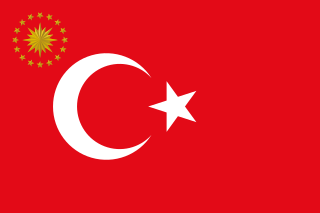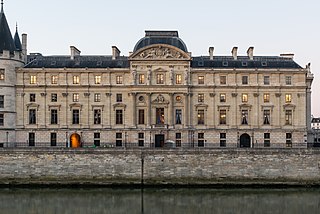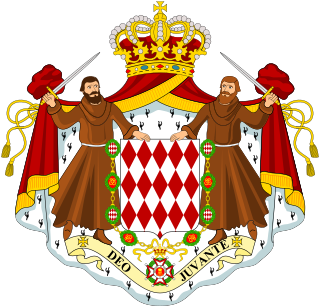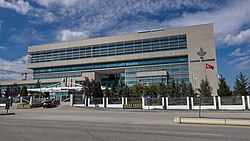
The politics of Turkey take place in the framework of a constitutional republic and presidential system, with various levels and branches of power.

The president of Turkey, officially the president of the Republic of Türkiye, is the head of state and head of government of Turkey. The president directs the executive branch of the national government and is the commander-in-chief of the Turkish military. The president also heads the National Security Council.

The Court of Cassation is the supreme court for civil and criminal cases in France. It is one of the country's four apex courts, along with the Council of State, the Constitutional Council and the Jurisdictional Disputes Tribunal.

The Constitutional Court of Ukraine is the sole body of constitutional jurisdiction in Ukraine. The Constitutional Court of Ukraine interprets the Constitution of Ukraine in terms of laws and other legal acts.

The judicial system of Turkey is defined by Articles 138 to 160 of the Constitution of Turkey.

The Democratic Society Party was a Kurdish nationalist political party in Turkey. The party considered itself social-democratic and had observer status in the Socialist International. It was considered to be the successor of the Democratic People's Party (DEHAP). The party was established in 2005 and succeeded in getting elected more than ninety mayors in the municipal elections of 2009. On 11 December 2009, the Constitutional Court of Turkey banned the DTP, ruling that the party has become "focal point of activities against the indivisible unity of the state, the country and the nation". The ban has been widely criticized both by groups within Turkey and by several international organizations. The party was succeeded by the Peace and Democracy Party.
In Greece, the Special Highest Court, is provided for in the article 100 of the Constitution of Greece. It is not a permanent court and it sits only when a case belonging to its special competence arises. It is regarded as the supreme "constitutional" and "electoral" court of Greece. Its decisions are irrevocable and binding for all the courts, including the Supreme Courts. However, the Special Highest Court does not have an hierarchical relation with the three Supreme Courts. It is not considered higher than these courts and it does not belong to any branch of the Greek justice system.

The Court of Cassation of Belgium is the supreme court of the Belgian judiciary. The court is composed of thirty judges with life tenure who are nominated by the High Council of Justice of Belgium and appointed by the Belgian federal government. The court handles cases in the two main languages of Belgium, Dutch and French, and provides certain facilities for cases in German. The court is assisted in its work by a public prosecutor's office and a bar association, which both function separately from other structures. The duty of the public prosecutor's office is to provide advisory opinions to the court on how the law ought to be interpreted and applied. The attorneys of the court's bar association assist litigants in proceedings before the court; in certain cases, their assistance is mandatory.
The judicial system of Greece is the country's constitutionally established system of courts.

In most legal jurisdictions, a supreme court, also known as a court of last resort, apex court, and highcourt of appeal, is the highest court within the hierarchy of courts. Broadly speaking, the decisions of a supreme court are binding on all other courts in a nation and are not subject to further review by any other court. Supreme courts typically function primarily as appellate courts, hearing appeals from decisions of lower trial courts, or from intermediate-level appellate courts. A Supreme Court can also, in certain circumstances, act as a court of original jurisdiction, however, this is typically limited to constitutional law.

The Court of Cassation, officially called the Supreme Court of Appeals of the Republic of Turkey, is the last instance for reviewing verdicts given by courts of criminal and civil justice in Turkey.
Abdurrahman Yalçınkaya is a high-ranking Turkish judge and the former Chief Public Prosecutor of the Supreme Court of Appeals of Turkey. Since the end of his term on 2011, he has been a member of the Supreme Court of Appeals' Eight Civil Department.

The Monegasque Supreme Court is the highest court of law in the city-state of Monaco for judicial appeals, administrative matters as well as ensuring the constitution of Monaco is upheld. It consists of three full judges and two assistant judges, appointed by the Prince of Monaco at the recommendation of the National Council of Monaco, the Crown Council, the Council of State, the Court of First Instance and the Court of Appeal. This is done in the ratio of one judge per institution. The Supreme Court was established in 1962 following the new constitution to guarantee fundamental liberties.

The Supreme Court, earlier known as the Supreme Court of Cassation, is the court of last resort in the Republic of Serbia. It is the court of cassation which reviews and possibly overturns previous rulings made by lower courts. It was established in 1846 by a decree of Prince Aleksandar Karađorđević. In the last 160 years since it was established, the Court has asserted its authority within judiciary in Serbia and beyond. The Supreme Court is today authorized by the Constitution of Serbia and the Law on Organization of Courts.
The judiciary of Poland are the authorities exercising the judicial power of the Polish state on the basis of Chapter 8 of the Constitution of Poland. As in almost all countries of continental Europe, the Polish judiciary operates within the framework of civil law.

The Supreme Court of the Dominican Republic is the highest court existing in the Republic and is, therefore, the head of the judiciary in the country.
The Kurdistan Workers' Party (PKK) announced a ceasefire on the 13 April 2009, declaring they would only retaliate in self-defense. The ceasefire was encouraged by the electoral success of the Democratic Society Party (DTP) in the municipal elections of 2009. Then in May 2009, the president of the Kurdistan Communities Union (KCK) Murat Karayilan released a statement supportive of an eventual peace process. Later, the PKK prolonged the ceasefire on the 1 June until the 15 July 2009. On the 15 July the DTP organized a manifestation in support of a peace process which was attended by tens of thousands of people in Diyarbakir, and the PKK again prolonged their ceasefire until the 1 September 2009. The Human Rights Association (IHD), Freedom and Solidarity Party and the Labour Party also supported a potential peace process.
The closure case of the Democratic Society Party (DTP) between 2007 and 2009 was against a pro-Kurdish political party in Turkey which was accused of opposing the unity of the country and having links to the Kurdistan Workers' Party (PKK). The case was opened in September 2007 and resulted in the closure of the party in December 2009. The DTP was the 25th political party which was banned in the Turkish Republic since 1962.
On 8 November a constitutional crisis unfolded in Turkey between the Court of Cassation and the Constitutional Court when the Court of Cassation intervened to overturn a ruling by the Constitutional Court regarding the release of an imprisoned member of the Turkish Parliament, Can Atalay.

Şerafettin Can Atalay is a Turkish lawyer, activist, and politician.
















